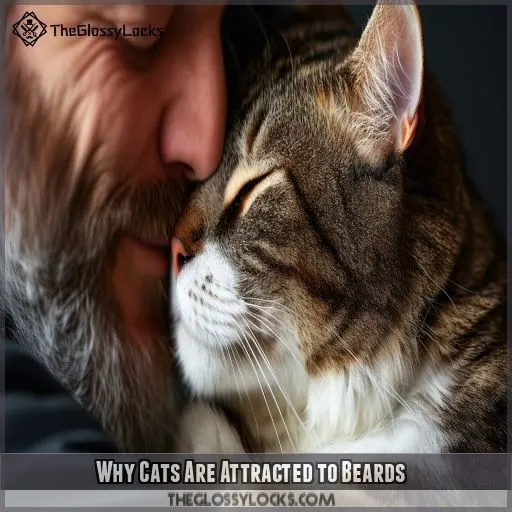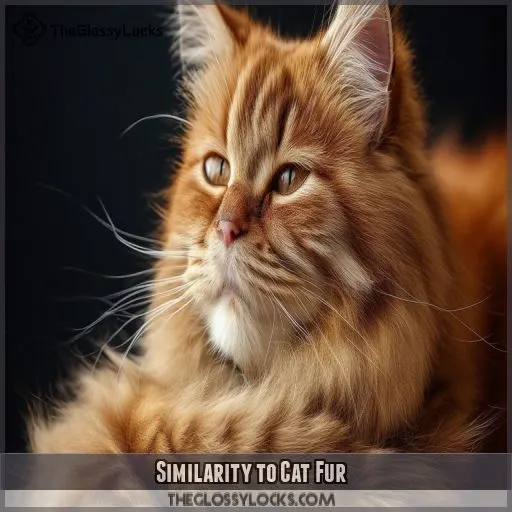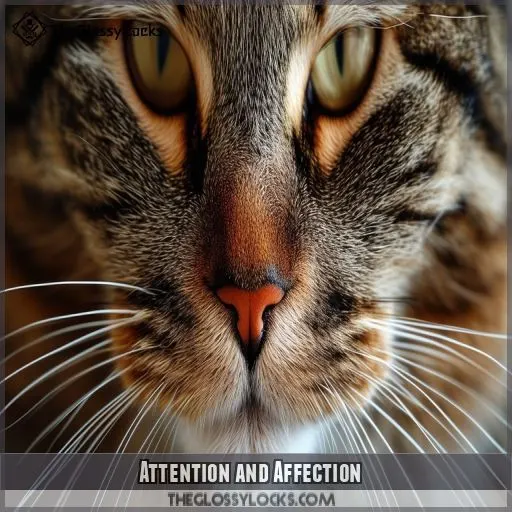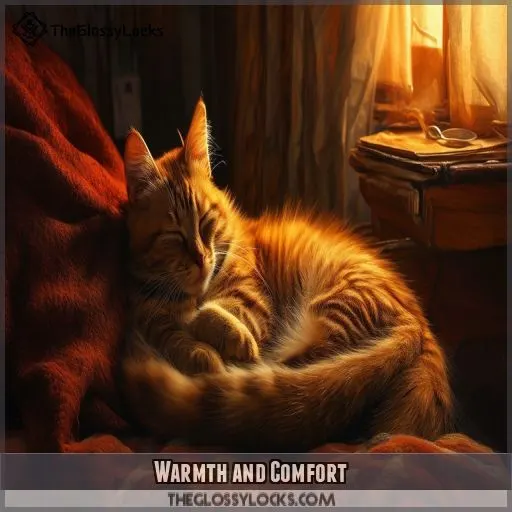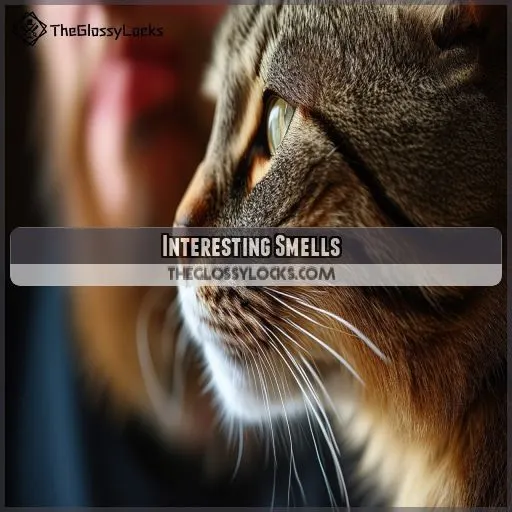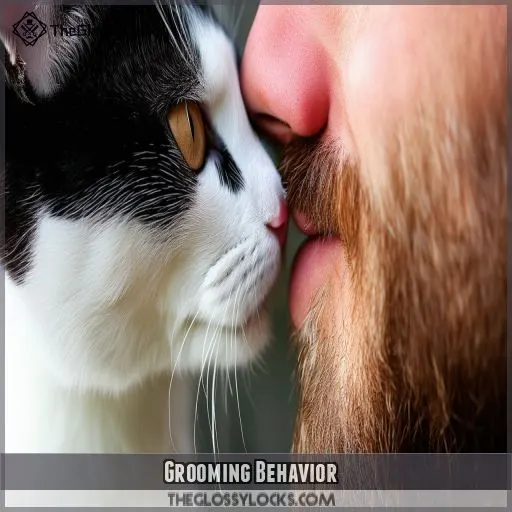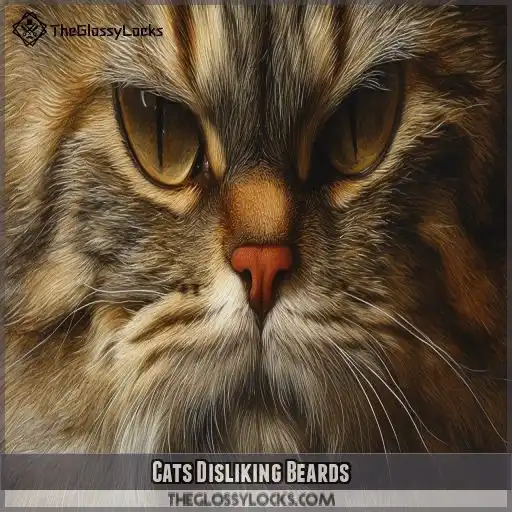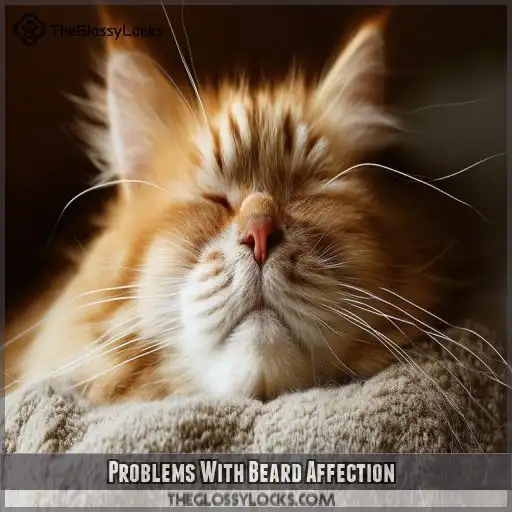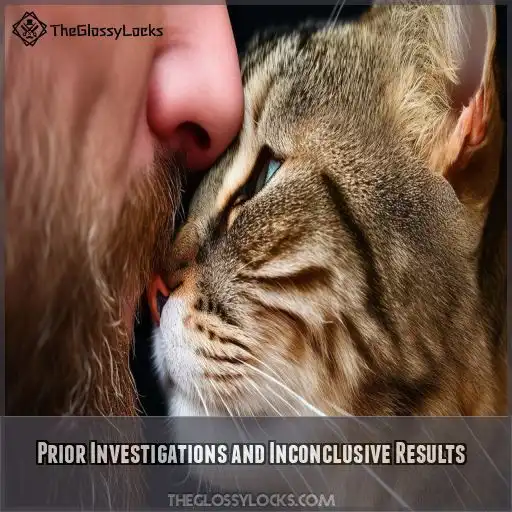This site is supported by our readers. We may earn a commission, at no cost to you, if you purchase through links.
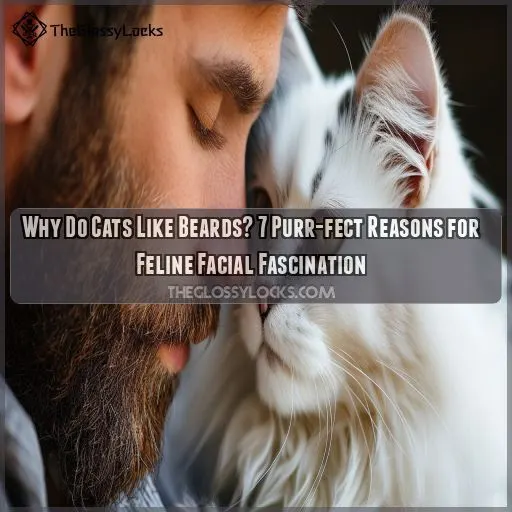 Curious about your cat’s captivating curiosity for your beard? Discover the fascinating reasons why cats like beards and how felines’ affection transcends whisker-like wonders. From the fur-like texture to intriguing scents, your cat associates your beard with warmth, comfort, and grooming behaviors.
Curious about your cat’s captivating curiosity for your beard? Discover the fascinating reasons why cats like beards and how felines’ affection transcends whisker-like wonders. From the fur-like texture to intriguing scents, your cat associates your beard with warmth, comfort, and grooming behaviors.
Explore seven scientific insights to understand this quirky yet endearing feline fascination. Enhance your understanding of your pet’s peculiar preferences and learn why your beard becomes a beacon of cat affection.
Table Of Contents
- Key Takeaways
- Why Do Cats Like Beards?
- Why Cats Are Attracted to Beards
- Similarity to Cat Fur
- Attention and Affection
- Warmth and Comfort
- Interesting Smells
- Grooming Behavior
- Cats Disliking Beards
- Problems With Beard Affection
- Prior Investigations and Inconclusive Results
- Materials, Methods, Results, and Interpretation of a Relevant Study
- Frequently Asked Questions (FAQs)
- Why does my cat always lick my beard?
- Why does my cat rub her face on my beard?
- Do cats like people with beards better?
- Why does my cat keep biting my beard?
- Do cats like beards because they resemble cat fur?
- How do cats show affection through grooming?
- Why do cats like beards if theyre indifferent to shorter ones?
- What does it mean when a cat paws/bites a beard?
- Can cats be jealous of beards?
- Conclusion
Key Takeaways
- Your beard is a cozy haven for your cat, offering warmth and comfort, especially during chilly seasons.
- Cats may show affection by grooming your beard, licking, nibbling, or nuzzling it, which is a way for them to bond with you.
- If your cat doesn’t like your beard, they may express their dislike through pawing or biting, indicating a desire for removal or difficulty in reading facial expressions.
- Cats are curious creatures, and their interest in beards may stem from the resemblance to fur, triggering grooming behavior.
Why Do Cats Like Beards?
Cats like beards for several intriguing reasons. Your beard resembles cat fur, sparking their curiosity and inviting investigation. Cats love the warmth and comfort, similar to their preferred bedding, and they may rub against your beard to leave their scent, marking their territory.
It’s also a source of interesting smells and tactile stimulation. Your beard can be associated with positive experiences, like getting treats or affection, and grooming it may show care and love. This fascination is part of their grooming behavior and social bonding.
Want to know if cats ever dislike beards, or the potential problems? Keep going!
Why Cats Are Attracted to Beards
Have you ever wondered why your feline friend can’t resist your facial hair? Cats’ attraction to beards stems from a combination of curiosity, comfort, and communication.
Your whiskers might be a source of fascination for your cat, offering a unique texture to explore. Beards can also provide a sense of control and hygiene for cats, as they may attempt to groom you just like they’d groom another feline.
This behavior isn’t just about affection; it’s a complex interplay of instincts and learned responses. Understanding these motivations can help you decode your cat’s beard-centric behavior and address any stress-related issues.
Similarity to Cat Fur
You’ve noticed your cat’s fascination with beards, and there’s a good reason for it. Beards resemble cat fur, triggering your feline friend’s instincts. This similarity can evoke several responses:
- Grooming urges: Your cat may feel compelled to lick or nibble the beard
- Territorial marking: Rubbing against the beard to leave their scent
- Play behavior: Batting at or pouncing on the beard
- Tactile stimulation: Enjoying the soft texture against their paws
This evolutionary purpose serves as a communication signal between cats. Your beard’s texture and smell provide a familiar, comforting sensation that satisfies your cat’s need for tactile exploration and bonding.
Attention and Affection
Your cat’s attraction to your beard may be linked to positive associations with treats or affection. Cats often view grooming behaviors, such as licking or nuzzling a beard, as a sign of care and love, reinforcing the bond between you and your feline companion.
Association With Treats or Affection
Just as your cat’s fur feels familiar, your beard might be associated with positive experiences. Cats are creatures of habit, and they may link your facial hair to treats or affection. This association can turn your beard into a feline magnet. Here’s a quick look at how cats might connect beards with good things:
| Beard Experience | Cat’s Reaction | Possible Association |
|---|---|---|
| Catnip beard | Excited | Playtime |
| Beard food | Curious | Mealtime |
| Treat habit | Expectant | Rewards |
| Affection grooming | Contented | Love |
| Beard love | Purring | Comfort |
Grooming as a Sign of Care and Love
When your cat grooms your beard, it’s not just about hygiene—it’s a display of affection. In feline psychology, social grooming strengthens bonds and promotes a sense of safety.
The tactile stimulation of licking your facial hair triggers a calming effect, similar to how a mother cat grooms her kittens. This behavior serves as behavioral enrichment, satisfying your cat’s natural instincts.
Warmth and Comfort
Moving from affection to comfort, your beard offers more than just a target for feline attention. It’s a cozy haven for your furry friend. Cats are drawn to your facial fuzz for its warmth and softness, especially during chilly seasons. Here’s why your beard is the perfect snuggle spot:
- Natural insulation: Beards trap heat, creating a toasty microclimate
- Texture paradise: Soft facial hair mimics a cat’s preferred bedding
- Wintertime refuge: Provides a warm retreat from cold surroundings
- Territory marking: Rubbing against your beard leaves their scent
This beard-cat bonding isn’t just about warmth—it’s a sensory experience that strengthens your connection. So, next time your cat nuzzles your chin, remember: you’re their personal, walking comfort zone!
Interesting Smells
Your beard’s a treasure trove of scents for your feline friend. Cats’ sensitive noses can detect a world of smells you can’t even imagine. They’re naturally curious, and your facial hair’s like a scratchy playground for scent exploration.
From the lingering aroma of your lunch to subtle pheromones, your beard’s a fascinating olfactory landscape. When your cat sniffs or licks your beard, they’re not just being affectionate – they’re indulging their innate desire to investigate new textures and smells.
It’s their way of getting to know you better, one whiff at a time.
Grooming Behavior
You’ve learned about cats’ fascination with scents, but their grooming behavior is equally intriguing. Your feline friend’s obsession with your beard might stem from their innate grooming routine.
That sandpaper-like cat’s tongue isn’t just for cleaning themselves; it’s a tool for bonding. When your cat licks your beard, it’s often a self-soothing behavior or a gesture of affection.
This recent behavior onset could be their way of including you in their grooming ritual. So, next time your cat starts grooming your facial hair, remember: you’re part of their inner circle now!
Cats Disliking Beards
While many cats enjoy beards, some felines may express dislike through pawing or biting, indicating a desire for removal or difficulty in reading facial expressions. Your cat’s reaction to your beard might also stem from jealousy or perceived threat, as studies have shown that a significant percentage of cats respond negatively to images of men with long, dark beards.
Pawing or Biting
While many cats adore beards, some felines mightn’t share the same enthusiasm. If your kitty’s pawing or biting your facial hair, they’re likely expressing their dislike or desire for its removal. Your beard’s appearance or feel mightn’t sit well with them, making it tricky to read your expressions. Here’s what pawing or biting might look like:
- Gentle swats at your chin, like batting a toy mouse
- Quick nips, as if trying to pluck out individual hairs
- Determined tugging, reminiscent of a cat pulling yarn
- Forceful head-butts against your face
- Frustrated meows accompanied by paw swipes
Jealousy or Threat
You might be surprised to learn that your cat’s dislike for your beard isn’t personal—it’s instinctual. Cats are territorial creatures, and your facial hair could trigger a primal response. Your beard might be seen as a threat, challenging your cat’s alpha status.
In fact, a study found that 79% of cats attacked images of men with long, dark beards. This "stranger danger" reaction stems from resource competition.
Your feline friend may view your beard as an intruder, competing for attention and affection. It’s a hairy situation, indeed!
Problems With Beard Affection
While cats may enjoy interacting with your beard, there are potential issues to be mindful of. Excessive scratching or biting can cause skin damage, and sudden changes in grooming behavior might indicate underlying health problems or stress.
Damage
When your feline friend shows affection for your beard, it’s not all purrs and cuddles. Their sharp claws and rough tongues can cause skin irritation and hair breakage. You might end up with painful scratches or even folliculitis. There’s also an infection risk if their grooming gets too intense. It’s a hairy situation that requires careful consideration!
Health Issues
While your cat’s beard fascination may seem harmless, it could signal underlying health issues.
Stress or anxiety might trigger excessive grooming behaviors. Allergies or skin irritation could cause your feline friend to seek relief in your facial hair.
Keep an eye out for these signs, and don’t forget about hygiene – your beard might harbor bacteria that could affect your cat’s health.
Routine
Your cat’s beard fascination can become a nightly routine, disrupting your sleep and self-care. This behavior, often self-soothing for your feline friend, may lead to:
- Constant nighttime petting demands
- Interruptions to your sleep cycle
- Difficulty maintaining a consistent bedtime routine
- Potential skin irritation from excessive scratching
Consider setting boundaries to guarantee both you and your cat get quality rest.
Prior Investigations and Inconclusive Results
While cats’ beard fascination is intriguing, previous studies have yielded inconclusive feline reactions. Researchers have explored various facial hair types, from clean-shaven to fully bearded, but results remain puzzling.
Gender-based preferences and cultural factors may play a role, yet the evolutionary significance of this behavior remains unclear. It’s like trying to herd cats – just when you think you’ve got it figured out, they surprise you!
These investigations have scratched the surface, but we’re still far from unraveling the mystery behind our furry friends’ beard obsession.
Materials, Methods, Results, and Interpretation of a Relevant Study
You’ll be fascinated by a recent study on cats’ reactions to beards.
Researchers exposed 214 female cats to photos of men with various beard types. The results? Cats went wild for long, dark beards – 79% attacked these images! Short beards? Meh. Incomplete beards? Confusing.
While intriguing, the study had limitations. It didn’t consider cat breed differences or cultural influences on feline behavior. Still, it sheds light on the evolution of cat behavior and its impact on human-cat relationships.
Next time your kitty paws at your facial hair, you’ll know why!
Frequently Asked Questions (FAQs)
Why does my cat always lick my beard?
Your cat licks your beard as a way of showing affection and grooming you. Cats lick their owners’ hair or skin, especially when they’re lying down or asleep, as a sign of care and love. It’s also a way to mark their territory by depositing their scent on you.
Why does my cat rub her face on my beard?
Your cat’s face-rubbing behavior is likely a display of affection and a way to mark its territory. Cats have scent glands around their cheeks, chin, and head, and they release friendly pheromones when rubbing their faces against people or objects as a form of bonding.
Do cats like people with beards better?
Cats don’t always prefer people with beards, but they’re often drawn to them. Beards offer a warm, fuzzy, and fragrant haven, resembling a cat’s fur and triggering their grooming instincts. It’s like a cat spa!
Why does my cat keep biting my beard?
Your cat may bite your beard as a form of affection, or to groom you. It could also be attracted to the scent, warmth, or texture of your beard. However, biting could indicate your cat’s dislike of your beard or a health issue.
Do cats like beards because they resemble cat fur?
Cats are curious creatures, and their interest in beards may stem from the resemblance to fur. The texture and feel of a beard can trigger grooming behavior, as cats view it as an extension of their own fur. This leads to licking, biting, and nuzzling as a sign of affection.
How do cats show affection through grooming?
Cats show affection through grooming by licking and biting. They leave a scent on you, claiming you as part of their social group. This is called allogrooming, a way to form social bonds and show comfort and relaxation in your company.
Why do cats like beards if theyre indifferent to shorter ones?
Cats like longer beards because they resemble fur, triggering grooming behavior. The coarse texture is similar to cat fur, and the length may make it more appealing to snuggle into, especially in cool environments.
What does it mean when a cat paws/bites a beard?
Cats bite and paw beards for various reasons. It could be a sign of affection, as cats groom each other by licking and biting. They may also bite if stressed, overstimulated, or seeking attention. Biting can also indicate underlying health issues.
Can cats be jealous of beards?
Cats can be a curious bunch, and their behavior often has us scratching our heads. So, can they be jealous of beards?
The answer is a resounding yes. While cats may love beards for their warmth and softness, they can also feel threatened by them, especially if they resemble another animal. This jealousy is more likely with long, dark beards, as they can change your facial appearance and make it harder for cats to read your expressions.
Conclusion
Cats and beards: a curious combination.
We’ve explored the reasons why cats are drawn to beards, from the fur-like texture to the intriguing smells. Now you understand why your beard becomes a magnet for feline friends.
While your cat’s fascination with your facial hair may be endearing, it’s important to remember that cats can have varying reactions to beards, and the length and style of your beard may influence their response.
So, if you’re considering growing a beard, be prepared for some extra attention from your furry friend, and remember to set boundaries and maintain good hygiene to keep both yourself and your cat happy and healthy.

